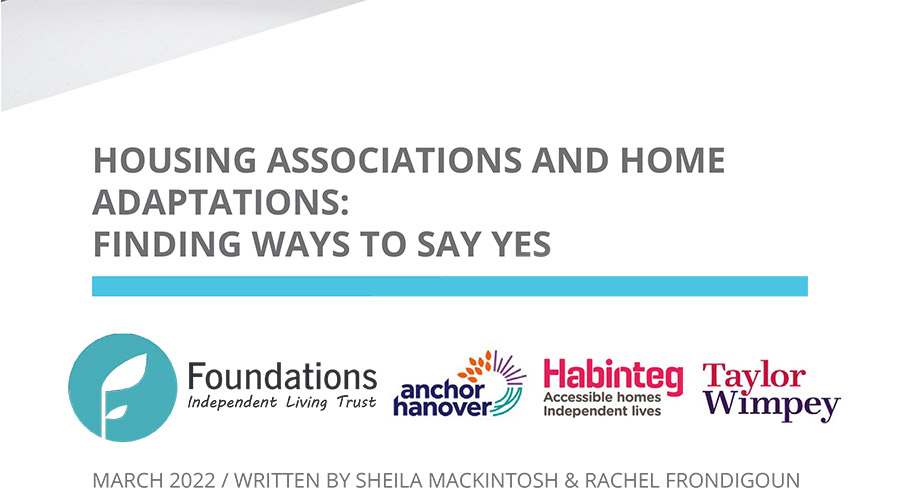Over half of housing association tenants do not get the adaptations they need, report finds

A new report from Habinteg, Anchor Hanover and Foundations Independent Living Trust, the charitable arm of the national body for home improvement agencies (HIAs) and handyperson services Foundations, has made key recommendations to improve the speed and effectiveness of home adaptations delivery in housing associations.
Entitled ‘Housing Associations and Home Adaptations: Finding ways to say yes’, the report makes recommendations to housing associations, local authorities, central government, and the Regulator of Social Housing to sort out the confusion about funding and improve the speed and effectiveness of home adaptations delivery.
It provides practical solutions to put disabled and older tenants at the heart of decision making, an inclusive approach to services, and for home adaptations to be part of the new person-focused inspection regime.
Paul Smith, Director of Foundations, said: “Following the publication of the Independent Review of DFG in 2018 we wanted to take a deeper dive into the workings of adaptations for social housing tenants. We knew that the housing world had changed significantly from the previous guidance in 2008 and that too many tenants were facing delay and frustration.”
The findings
The research uncovers that 54 percent of housing association tenants have a long-term illness or impairment, and that nearly one in five new lettings are to people with a defined disability. In contrast, of those surveyed, one-fifth of disabled tenants say their accommodation is unsuitable, while 56 percent of those needing adaptations do not have them.
The research identifies good practice, particularly in Large Scale Voluntary Transfers (LSVTs) that control their own adaptations budgets, those fully engaged with their disabled and older tenants, or where there are effective partnership arrangements.
However, it also reveals issues in funding and delivery including splits in legal responsibility, a confusing pattern of funding, a postcode lottery in the type of services provided, complex customer journeys, and frustration for staff in local authorities and associations.
Rather than saying ‘yes’ to adaptations, barriers are often placed in the way and adaptations may be refused, especially in general needs properties, the report underlines. They may also be removed unnecessarily when tenancies change.
Foundations Independent Living Trust’s latest report also reinforces that moving home is not easy if a home is unsuitable or not possible to adapt. It further warns that not enough accessible homes are being built, and adapted homes are not recycled effectively.
Asset management databases are sometimes incomplete, there are few accessible housing registers, void times are too short, and there is not enough support to match people to properties or provide help with moving, the document adds.
According to the research, home adaptations lack importance. Although disabled tenants form a substantial part of housing association populations, most associations see adapting homes as a minor operational issue. It is not part of a strategic plan to make the stock work for everyone, the report finds.
There is also a lack of disabled people working in the sector. A National Housing Federation Survey in 2021 showed that disabled people are under-represented as staff members, not visible as leaders in the sector, and under five percent of board members identified as disabled.
Recommendations for the housing sector
Based on the findings, the report makes a series of key recommendations to housing associations, central government, councils, and the Regulator of Social Housing to improve adaptations delivery.
Key themes include ensuring a clearer process for Disabled Facilities Grant (DFG) delivery, making adaptations a key part of building planning and inspection, and ensuring co-production with service users to drive improvement.
Housing associations are advised to: ensure that routine housing reviews include future housing needs i.e., adaptations and moving; review adaptation budgets; set the minor adaptations threshold at a minimum of £1,000 per case to prevent handovers to local authorities, long waiting times for tenants, cover the rising cost of work, and develop better designs; use co-production with disabled and older tenants to drive service improvement; and make sure adaptation staffing levels are adequate to meet demand.
The report recommends that local authorities top-slice DFG funding for specific associations to allow them to manage work themselves.
Suggestions for central government include updating the DFG allocation formula to take account of housing association use of the DFG and issuing guidance to make the level of contribution to the DFG consistent for all housing associations across England.
The Regulator of Social Housing’s inspection regime should include home adaptation and home move services for disabled people of all ages, the report advises.
Read all of the recommendations, alongside the full report, here.
About Foundations
Foundations is funded by the Department for Levelling Up, Housing and Communities (formerly named the Ministry of Housing, Communities & Local Government). It provides support to over 200 not-for-profit home improvement and handyperson service providers in England that cover more than four-fifths of local authority areas.
Its core objectives are to: develop the capacity of the HIA sector; represent the sector to government and other stakeholders; and maintain a database of HIA services for the general public.
Home improvement and handyperson service providers are local organisations dedicated to helping older people, people with disabilities and vulnerable people to live in safety and with dignity in their own homes. Services are focused on ensuring existing housing is fit for purpose and vulnerable people, predominantly homeowners, are able to continue living independently as long as possible.
Foundations recently launched the new AdaptMyHome online self-assessment portal, which supports the needs of local authorities, council staff, and clients looking for more support at home.
The portal strives to streamline the DFG application process and address the lengthy council waiting times for clients who are looking for help to live comfortably in their own homes. It is intended to give clients a greater understanding of the home adaptation options they have.

